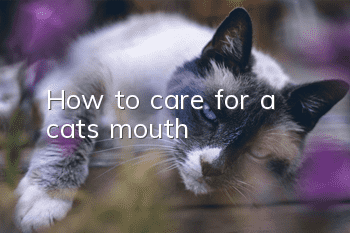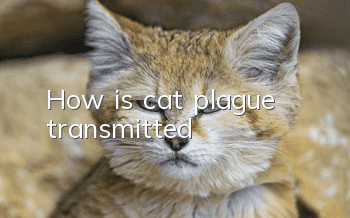How to care for a cat’s mouth?

Cat oral care methods:
1. Teeth cleaning. It is best to go to a professional pet clinic to clean the pet cat’s teeth. Clean the cat’s teeth once a year and thoroughly clean the cat’s teeth. Just clean the stones and dirt in the gums.
2. Brushing teeth, this is the care of the cat’s oral cavity in daily life. Pet cat owners can brush the cat’s teeth regularly, and at the same time, they can also train the cat to brush its own teeth. Brushing your cat's teeth 3-4 times a week can completely remove the dirt in your cat's mouth and maintain your cat's oral health and hygiene.
3. Food. In daily life, owners should try to use less sticky food for cats and choose more dry food. Dry food will not stick to the cat's teeth like sticky food. At the same time, dry food can also protect teeth to a certain extent.
4. Toys, to care for the cat’s oral cavity. You can buy some teeth grinding toys and play with them during leisure time or after meals. This can not only entertain the pet cat, but also protect the cat’s oral cavity.
The oral problems of cats include the following:
1. Dental calculus and bad breath. Cats’ teeth are prone to tartar formation, and the process is very similar to that of humans. The formation of dental plaque comes from bacteria, saliva and food residues, and finally forms dental calculus through the mineralization process. Unless it is cleaned regularly, serious dental problems will occur. Stone accumulation and bad breath; excessive tartar can cause gingivitis.
2. Gum ulceration and broken teeth. Gum ulcers are also called "isthmic lesions" (meaning disease occurs where the teeth and gums come into contact). Ulcers usually appear on the gum line of young cats, thereby destroying the entire tooth tissue. When the teeth are damaged, they will easily break; in addition, when the ulcers spread to the root of the tooth, it will also lead to root abscess. .
3. Stomatitis. It is a rare but serious dental disease, because platelet allergy can trigger the cat’s own immune system to attack its own gum tissue, causing damage to the teeth. During treatment, steroid drugs can be given and the teeth should be cleaned at least every three months. , Do a good job in daily dental care, which will improve the condition. To completely cure it, all damaged teeth must be extracted.
4. Other dental diseases. Rotten teeth can cause significant local reactions such as pain, swelling, and severe bad breath. Tooth decay can cause systemic reactions, such as fever, progressive weight loss, thickening of hair, loss of appetite, etc. Diseased teeth can also have many indirect negative effects on other parts of the body, especially the heart and kidneys.
- Which one is better, hair removal cream or cat grass? A must-read for pet owners!
- Why do cats keep losing weight?
- Is erythromycin ointment poisonous if licked by cats?
- The cat’s meow is hoarse and very small
- Training your cat to sharpen its claws can relax you and calm your mood!
- Ragdoll cats are beautiful, but these three shortcomings cannot be ignored. Novices must not keep them.
- How to get rid of fleas on kittens?
- How old can a cat take hair removal cream? How often should cats use hair removal cream?
- Signs that a female cat doesn’t want to take care of her babies
- What vegetables do cats eat?



